Love the Stranger
Looking beyond our own borders, we have a duty to help people flourish in their homelands, as well as welcoming those who leave in search of a better life.”
Migrants and refugees are human beings not just statistics, says Bishop as Bishops’ Conference releases new publication.

In 2023, people making dangerous journeys across the Channel to reach the UK are called by various names: ‘refugees’, ‘asylum seekers’, ‘migrants’, and often by more derogatory terms.
Love the Stranger is a new publication by the Catholic Bishops’ Conference of England and Wales’ Department for International Affairs that articulates our Christian duty to look beyond such labels and see the person who has left their homeland in search of a better life.
You can download the document at: cbcew.org.uk/love-the-stranger
Bishop Paul McAleenan, Lead Bishop for Migrants and Refugees for the Bishops’ Conference, emphasises the need to uphold their innate human dignity: “Our starting point as a society must be to recognise migrants and refugees as people. We need to understand their stories, their reasons for leaving their homelands and hopes for building a future here.
“We should never view people arriving from elsewhere as a political problem to be solved, but rather as brothers and sisters who we have a responsibility towards, and who greatly enrich our communities.

“People are driven to leave their countries, sometimes making dangerous journeys or risking exploitation, because of conflict, poverty, oppression, or lack of opportunities.
Cardinal Vincent Nichols, President of the Bishops’ Conference, welcomed the publication: “Love the Stranger draws together more than one hundred years of Catholic teaching to guide our response to migration in England and Wales today. While it does not propose detailed solutions to complex problems, it clearly calls for procedures which permit safe and controlled access and a fair hearing to those seeking asylum. Present arrangements in this country are dramatically lacking in both of these requirements.”

Vatican endorsement



Father Fabio Baggio CS, the Undersecretary of the Dicastery for Promoting Integral Human Development, praised Love the Stranger’s rich review of, and reflection on, Catholic social teaching: “The text promotes an authentic culture of encounter at all levels and among all the actors involved. As we live in times in which the defence of the dignity of each human person may seem under threat, Love the Stranger invites us to not give up on the opportunity to live our catholicity ever more
Three parent baby – Life Bishop’s Statement


the technical manipulation of new life with the loss of human life as part of the technique.
Bishop John Sherrington, Lead Bishop for Life Issues for the Bishops’ Conference, has made a statement on the use of mitochondrial donation treatment and the birth of a ‘three parent baby’.

“The recent news that a ‘three parent baby’ had been born through the use of the ‘mitochondrial donation treatment’ (MDT) is deeply concerning. It shows a further step in
“The technique depends on the destruction of two human lives who had inherent dignity and rights and must be protected from their creation as persons in order to create a third embryo and life. It also fractures the child from biological parenthood. It steps into the unknown world of genetic engineering with manipulation of the human germline.
“In one of his recent speeches in Budapest, Pope Francis made extensive reference to the 20th-century intellectual, Fr Romano Guardini. He said, ‘Guardini did not demonise technology, which improves life and communication and brings many advantages, but he warned of the risk that it might end up controlling, if not dominating, our lives… he
foresaw a great threat… We arbitrarily fix our goals and force the mastered powers of nature to bring them to fulfilment.’
“The gift of life, to be respected and treated with dignity from conception to natural death, is a mystery which cannot be reduced to technical manipulation.”

fully, to build more just and equal societies for the benefit of each and every person, and to be open to the contribution that strangers can offer as we care for their integral human development and ours.”
Protection of migrants and refugees a shared goal

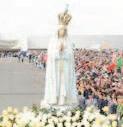
Fr Manuel Barrios Prieto, the Secretary General of COMECE (Commission of Catholic Episcopal Conferences of the European Union) welcomes the publication as an important step forward towards the promotion and protection of migrants: “This advocacy document on the Catholic response to migrants and refugees is a timely reference and guidance in our polarised European societies.
Continued on page 4
JUNE 2023
page 15
Fatima statue and saints relics visit York page 11
Coronation celebration street party
Edition 18 www.CatholicPost.co.uk Ss Peter and Paul feast day 29th June OUR LADY QUEEN OF HEAVEN CATHOLIC PRIMARY SCHOOL Hare Lane, Langley Green, Crawley RH11 7PZ Headteacher Tobias Melia Telephone 01293 526057 Be er Never Stops!
Benemerenti Medal awarded for fostering warm relations with our Anglican friends page 8
CBCEW
The technique depends on the destruction of two human lives who had inherent dignity
CBCEW
We should never view people arriving from elsewhere as a political problem to be solved, but rather as brothers and sisters who we have a responsibility towards, and who greatly enrich our communities.
CONTACT US:
The Catholic Post is published by its owners Bellcourt Ltd and is wholly independent of and separate from any previous newspaper. The Catholic Post is published on the last Sunday of the month previous to publication date.
EDITOR: John Clawson
email: editor@catholicpost.co.uk
ADVERTISING:
Natasha / Bellcourt Ltd.
01440 730399 / 07903 377019 ads@bellcourt.org
DESIGN & LAYOUT: David Lodge, david@bellcourtltd.co.uk
PUBLISHED BY: Bellcourt Ltd. N2 Blois Meadow Business Centre, Blois Road, Steeple Bumpstead, Haverhill, Suffolk CB9 7BN 01440 730399
ARTICLES TO:
The Catholic Post email: editor@catholicpost.co.uk or david@bellcourtltd.co.uk

Please send articles for publication by email, supplying any photos separate to the text We welcome contributions
Here are answers to some basic questions about writing for The Catholic Post
How long should articles be?
Usually it seems to work out best if contributors simply say what they have to say and let us worry about finding a spot for it in the paper.
What is the submission procedure?
Please send as a Word file attached to an e-mail. To submit articles for publication, contact John Clawson by email at editor@catholicpost.co.uk Charts, graphs, and photos should be submitted as separate PDFs. Electronic photos should not be embedded or pasted into a Word document as this reduces their quality.
Photographs and Illustrations
Photographs and Illustrations should be supplied electronically as high resolution JPEG (*.JPG) files).
Photographs and illustrations should be sent in colour with a resolution of 300 dpi and a minimum size of 100 mm x 100 mm when printed (approx. 1200 pixels wide onscreen).
Computer print-outs are not acceptable. Screen captures are not ideal as they are usually not very high
Parental permission should be sought before submitting photographs of minors.
Source information -
DW = Diocesan Website.

ICN = Independent Catholic News
Views expressed in The Catholic Post are not necessarily those of the editor
Last date for copy is the LAST DAY of the month prior to publication.
The Sanctity of Life
published there were justifiable anxieties. Rather than empowering and protecting people in the area of end-of-life decisions, some of the original proposals appeared to seriously threaten them. On several occasions the bishops proposed changes to improve the safeguards in the bill. A vital provision was inserted into the Act to make clear that it did not change the law prohibiting euthanasia or assisted suicide.
During his 2010 visit to this country, and specifically on his visit to the elderly residents of St Peter’s care home in London, Pope Benedict XVI said: “Each of us is willed, each of us is loved, each of us is necessary. Life is a unique gift, at every stage from conception until natural death, and it is God’s alone to give and to take.”
The catechism teaches: Human life must be respected and protected absolutely from the moment of conception. From the first moment of his/her existence, a human being must be recognized as having the rights of a person. Among such fundamental rights (is) every human being’s right to life and physical integrity from the moment of conception until death.
The moment a positive law deprives a category of human beings of the protection which civil legislation ought to accord them, and in particular the more vulnerable, the very foundations of a state based on law are undermined.
We are all older than we think – around nine months older. We celebrate the anniversary of the day on which we were born, but we have actually been in existence since the moment of our conception. That’s when we came into being – a reality no one can dispute though they may try. No matter what the proponents of abortion might try to pretend, and no matter what their propaganda might claim, life is life from the moment of conception and, in England and Wales alone, we are currently terminating around 200,000 unborn lives each year.
We are all only too well aware of the horror and carnage of the First World War battlefields, and one name in particular typifies that carnage: “Passchendaele” (officially the Third Battle of Ypres). In the four months from July to November, 1917, the battle of Passchendaele cost around 250,000 British lives. Almost that same number of lives are being terminated every year in England and Wales through abortion. Around a million British military and civilian lives were lost in the First World War causing much hand-wringing and the conflict
to be labelled “the war to end all wars”. But it wasn’t - because we forget all too easily. At current rates we will lose that same number of innocent lives to abortion every five years, but, far from wringing our hands, as a nation we don’t seem to be overly concerned about this particular loss of life.
Legislation is now turning its attention to the termination of adult lives also. In particular, the legal door seems to be being increasingly forced open, offering protection to those wanting the right to assist others to end their life.
“Christian faith gives us reason to cherish life, as a gift from God, and also gives reason to accept death, when it comes, with hope in God.” The catechism reminds us that while “grave psychological disturbance, anguish or grave fear of hardship or suffering can diminish responsibility”, “we are stewards, not owners, of the life God has entrusted to us. It is not ours to dispose of.” (para 2280) “Voluntary cooperation in suicide is contrary to the moral law.” (para 2282)
Permitting people to take their lives or others to assist them, is not a moral option. If someone facing severe physical or mental incapacity, or terminal illness, is contemplating ending their life as an alternative to what they perceive their future to be, far from being allowed to put that decision into practice, either by themselves or with the assistance of someone else (and why do they have to involve others?), surely they should be helped to see that there are other options open to them. Whether in a hospice, or at home with nursing support, compassionate palliative care can help them live as comfortably as possible, and with dignity, until death comes naturally. Even when legislation appears to protect the sanctity of life, we still have to be cautious. The Mental Capacity Act addresses the practical health care choices that may have to be made on behalf of people who are not be able to make those choices for themselves.
For several years, patient groups, lawyers, and others had argued that a new law was needed in this area. But when a first draft was
And so it says: Doing anything to cause death, even at the request of the patient and as an “act of mercy”, remains murder in English law, and assisting a patient to commit suicide also remains a serious criminal offence. The Act unfortunately retains a feature of recent English law which has put the law in conflict with sound morality, namely (its) acceptance of certain decisions to bring about death by omission or withdrawal of life-sustaining treatment or of food or water in circumstances where, although death is not imminent, the decision-maker considers that continued life is not worthwhile.
That’s what frightens a lot of people –especially the elderly and more vulnerablethat legislation might permit someone else to decide that their life “is not worthwhile”. The Church’s moral teaching in this area states unequivocally: Whatever its motives and means, direct euthanasia consists in putting an end to the lives of handicapped, sick, or dying persons. It is morally unacceptable. An act or omission which, of itself or by intention, causes death in order to eliminate suffering constitutes a murder gravely contrary to the dignity of the human person.
Parliament abolished capital punishment in the United Kingdom in 1999, completing a legislative process that began with the Murder (Abolition of Death Penalty) Act of 1965. Opponents of capital punishment rightly claim, as you often hear it expressed, that the state should not be in the business of taking lives. And yet just two years after that Act, the 1967 Abortion Act opened the door to an annual termination rate in England and Wales currently approaching, as we noted earlier, a quarter of a million. As if that wasn’t bad enough, we are getting ever closer to seeing the passage of legislation that would permit further lives to be taken through assisted suicide. Where, in all of this, is that same national voice of protest that the state shouldn’t be in the business of taking livesbecause that’s what it is doing.
Page 2. The Catholic Post. June 2023.
From the presbytery.............. by Fr Neil McNicholas
“Each of us is willed, each of us is loved, each of us is necessary. Life is a unique gift, at every stage from conception until natural death, and it is God’s alone to give and to take.”
Caritas Westminster calls for more action to prevent homelessness
Caritas Westminster
At a time when homelessness in the UK has reached record levels, the agency said: "As we approach the Coronation of King Charles III, we urge the authorities to work closely with homeless services to ensure that those experiencing street homelessness are not simply asked to move on, as part of a 'cleanup', but are instead provided with longer term support to help them to move off the streets, like we experienced during the 'everyone -in' campaign in the pandemic.
"80% of people currently sleeping rough have complex health and social needs due to
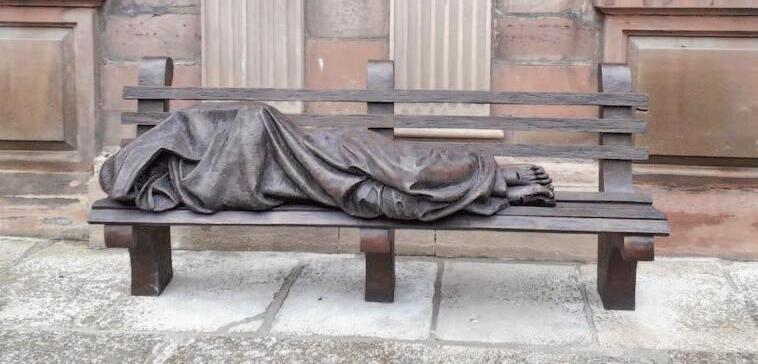
difficulties in their past, often caused through no fault of their own. Some may have resorted to alcohol and drugs in order to supress the cold, the pain and the worry. Addictions and past traumas cannot be addressed purely by the provision of accommodation. There is an urgent need for mental health and addiction support, and most importantly lots of time and patience. These are complex responses, that require specialist intervention from commissioned homeless services. Church communities can provide food, welcome and
A Great Tamil Celebration
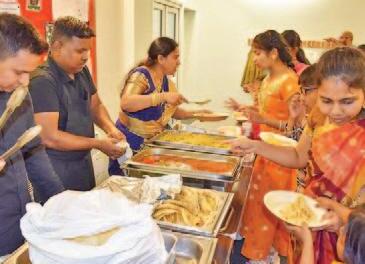 Mgr Daniel McHugh
Mgr Daniel McHugh
befriending support alongside these partners, and advocate for social change.
"At Caritas Westminster, we support parishes to reach out and support those most in need in our communities. We encourage Catholics to look to those who are street homeless without judgement, but with love and kindness; to be present for them and to listen to them.
We have previously asked ‘Should we give money to beggars' "We also encourage Catholic parishes and schools to consider the hidden homeless, such as families and young people living in temporary accommodation; in hostels, sofa surfing and in B&Bs. News reports this week have highlighted how many children are living in overcrowded accommodation, not able to sleep properly due to sharing beds with other family members and with no space to do their homework.
Praying the Rosary, bead by bead, is alike to reading the Gospels in brail. Once we have learnt the sequence of the mysteries, we can then follow the life of the Holy Family by praying the Rosary, even if we can’t read.
Regular use of one decade a day, with added scriptural texts, proves highly effective. In families, to pray after a meal but before the clearing of the dishes, keeps the family together until prayer is completed.
For younger children, the time between getting into bed and before turning off of the lights provides another natural time to pray as a child will normally stretch this time rather than turn the light off!
Very young children will join in with prayers in their own way. It is never too young to pray. We will learn a great deal from young children if we are only willing to listen.
So listen to each other, share, be small. Thank God for all things, both the good and the difficult. Enjoy the light of candles and the silence of the phone being unplugged. Above all, share the leadership of the decades and prayers.
A Mother’s Prayer for Her Children
As thou didst walk the fields of Galilee, O loving Saviour walk with them for me: for since the years have passed and they have grown I cannot follow, they must walk alone. Be thou my voice when sinful things draw near pleading with them for all that will endure.
Sunday 30 April - the monthly Mass of the Tamil speaking Chaplaincy took place once more in Sacred Heart Church, Bilton, Rugby, where Canon Gerard Murray is Parish Priest.

The people who gathered there are in the main from Tamil Nadu in India and from Sri Lanka.
The Chaplain is Father Arul Samy and he is assisted by a wonderfully active group of young families led by Gilbert Raja.
What a joyful occasion marking Easter and Independence Day (which had been marked
by the wider community the week before). The families came in traditional dress, sang in their own language and played their instruments. It was a beautiful Mass, presided over by Father Arul, and incorporating elements of Tamil culture.

After Mass came the social time with music, dance and sketches, followed by a beautiful meal, and special presentations showing their appreciation of Diocesan support for the special chaplaincy provision, which keeps people strong in their Faith.
"Friendships formed through strong Church or School communities can provide a social safety net for people going through tough times, helping to prevent homelessness.
Elizabeth Wills, the Caritas Westminster lead for homelessness in the Diocese of Westminster, has been listening to those affected as part of a project with the Cardinal Hume Centre and Justlife in conjunction with local services. She speaks to young families living in crowded accommodation, with inappropriate sleeping arrangements. She has met families with several young and older children sharing mattresses on the floor, without carpets, often in rooms with little ventilation, rising damp and mould that leads to respiratory conditions. Others live in unsafe streets, and with broken doors, windows and appliances that never get fixed, despite frequent complaints. She is helping those affected to advocate for change.
"As the country came together to celebrate the Coronation of our new monarch, so we can come together to demand that those in authority do more to ensure everyone has a decent home."
Be thou the hand that would keep theirs in mine and all things else a mother must resign. And as Thy Blessed Mother guided Thee O kind and loving Jesus, guide my boys and girls for me.
www.crownofthorns.org.uk
email: office@crownofthorns.org.uk
Crown of Thorns Mission of Hope
Promoting the Holy Rosary in the U.K. & throughout the world to bring hope, comfort and peace to the marginalised, the oppressed and the imprisoned, enabling wounded hearts to find healing and shattered lives to find breath and space to renew.
Supporting priests and chaplains in their ministry, outreach and welfare.
Crown of Thorns relies on experienced personnel giving their time free of charge to carry out the work of the charity.

www.crownofthorns.org.uk
email: office@crownofthorns.org.uk
Phone: 01342 870472
Registered charity no: 1042751
The Catholic Post. June 2023. Page 3.
Homeless Jesus by sculptor Timothy Schmaltz, Farm Street Church, Mayfair
Caritas Westminster made an appeal for long-term solutions for those sleeping rough or in poor quality homes, ahead of the Coronation of King Charles III
The secret of the Rosary is to enjoy, to explore, to imagine
Bloom Review: An independent review into how government engages with faith
review gives specific attention to the place of faith in prisons and in the armed forces
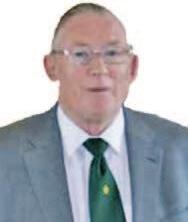
On Wednesday, 26 April, Colin Bloom, Independent Faith Engagement Adviser to the government, published his independent review titled: Does government ‘do God?’ examining how the government engages with faith.

We welcome that the review heralds the vital contribution made by faith communities, including the Catholic Church, to the common good of society – providing for believers and non-believers alike in educational and healthcare settings as well as many other areas of public service.
For example, there are 2,175 Catholic schools, colleges and academies across England and Wales, representing just under 10% of state education. Catholic pupils achieve the highest GCSE RE results in the country and represent a quarter of all entrants.
The detail of specific proposals, such as those that relate to supplementary schooling, will
Continued from page 1
It offers sound orientations on migration and asylum not only for Catholics, but for any person of good will who considers human dignity as the basis for a harmonious social coexistence. It is not a mere compilation of principles of the Social Doctrine of the Church on the matter, but a reflection on how these principles should be applied to the current challenges faced by our states and societies.”
Christine Allen, Director of CAFOD, the official aid agency of the Catholic Church in England and Wales, stresses that people have a right to flourish in their homelands: “People around the world continue to be tormented by conflict, which drives them from their homes as they seek safety. Communities are also losing their homes and their livelihoods to a climate crisis they did not cause.
“Working toward peace and tackling the climate crisis are the defining challenges of our time and we must show solidarity to those in need. The UK government can rise to these shared global challenges by reversing the counterproductive cuts to the aid budget, and prioritising countries impacted by conflict and climate change.
“Failure to act will mean people around the world continue to see their lives turned upside down and their homes destroyed by conflict and climate change.”
need to be examined to assess the practical implications on sacramental preparation, children’s liturgies and catechesis, all of which make an important contribution to the development of young people and the building of our diverse Catholic communities.
The review gives specific attention to the place of faith in prisons and in the armed forces. The Catholic Church has long established provision for chaplaincy in prisons and, through the
Bishopric of the Forces, the Royal Navy, British Army, and Royal Air Force.
We remain committed to working with Government in all areas of common interest but particularly around promoting religious
literacy and Government understanding of a Catholic approach to education, prisons and the armed forces. You can also read a statement on the review from the Catholic Education Service on their website at catholiceducation.org.uk
Parish Matters
The Private Life of Priests
Our priests are Holy Heroes!
When Maslow identified his ‘Hierarchy of Need’ theory for humanities development, he began with the basic requirements of ‘food, water, air, shelter and rest’ as the foundation. While not suggesting that our clergy are homeless, starving or without a bed, it is shameful to consider how they survive the circumstances of their daily lives, as they minister to the parish. Rarely do we consider the actuality of their daily life.
A great recently retired friend, departed his ministry in a northern inner-city parish. His final weeks had been tumultuous, not only celebrating the lengthy Holy Week and Easter liturgies, but also preparing for his Religious Order’s departure from the parish after one hundred and seventy-five years of service. The General of the Order visited from Rome to acknowledge the major event. This priest also celebrated his 80th birthday on Holy Saturday. His relief was that his future accommodation was assured and the parish responsibilities of leadership had been surrendered. As for any elderly person on retirement, life style changes and routines without any responsibilities will be welcomed.
For any priest in active ministry there comes a time when the call to move on, is faced. This means the emotion of farewells and hellos, the inspection and familiarisation of a new property, the packing and unpacking of personal items usually including many books. The sorting of local services including
registrations with doctors and dentists and the myriad of other matters that anyone on moving house has to arrange. All this while having to be ready for the intensity of parish life. One retired priest told me that he had lived in fourteen different addresses during his ministry. Another active and charismatic priest on being asked about moving recently stated emphatically ‘that’s me done – no more moves.’
The nature of new presbytery and accommodation can vary from one appointment to the next. Not simply a matter of hanging new curtains but considering a new plan of a property that would not necessarily be a first choice but was dictated by circumstances. A large house, built for an army of curates and a live-in house keeper, may now be providing for a single priest. Or it may be poorly provided where the building doubles in use for both the parish and priest’s residence, where kitchen cupboards are shared with parish societies. It may be too small for an appointee’s possessions, so living from boxes or goods stacked in passageways can become a lengthy experience. Such circumstances are the background reality while trying to assess the parish culture and needs, meeting new parishioners and as always celebrating daily Mass, advising and consoling a community who are also trying to determine who the Bishop has sent this time.
The retired priest may shed the pressing responsibilities but his personal needs may not be resolved. They may be assigned retirementhome accommodation, but with an
expectation of some commitment to a chaplaincy roll; they may be offered a retirement house, possibly a redundant presbytery; or they may be expected to find their own retirement base. Expectations that they could continue to act as a Sunday supply priest ‘for as long as they are able’ may well be hinted at. Such an experience may well present a break from a lonely existence as previous regular movements do not allow for the development of personal friendships. With a limited pension and varying supported provision affording a retired lifestyle is a further question.
Were things any better in the old days? Fr John O’Connor, (a.k.a. Fr Brown as he was the inspiration for G.K. Chesterton clerical sleuth) was ordained for the Diocese of Leeds in 1895 and served in the Industrial towns of Leeds, Bradford, Halifax and Keighley before settling as parish priest in Heckmondwike ten years later. A total of eight moves in that time but added a further two before stopping at St Cuthbert’s Bradford where he remained until his death in 1952. By that time the Diocese, under a certain Bishop Heenen, had been nicknamed ‘The Cruel See’ such was the pace of movement of clergy. It was even rumoured that curates slept with packed suitcases under their beds!
The life of a priest is a dedicated and difficult vocation but can be made unnecessarily more difficult by such circumstances. Our priests are indeed Holy Heroes!
Page 4. The Catholic Post. June 2023.
Peter Boylan KSG
ICN
The
Following Saint Francis of Assisi in our modern world
Terry Mortimer
Perhaps the most popular of Saints is Francis of Assisi. Known worldwide for his love of creation and God’s creatures, he is admired by Christians and non-Christians alike.

This remarkable man achieved so much in adult life; dying as he did at the age of 44, but there is so much more to Francis than his love of animals and creation.
The son of rich merchant, and in his youth a ‘bit of a lad!” he had a conversion experience at the age of 25 to 26yrs of age, when Our Lord spoke to him, saying “Francis repair my Church, which as you can see is falling into ruin.”
Francis naturally thought the Blessed Lord was talking about the physical building in which Francis heard the message. He set out about rebuilding that church. The Catholic Church at that time was falling into disrepute and Our Lord was really referring to the declining state of His Church.
Initially having an experience where he set aside his former life and taking on the life of the way of the Lord, Francis began to live a life influenced by the Holy Gospel. He had no intention of forming a new Order, but what transpired was many hundreds and, in due course, thousands followed him in this new calling.
Married man and women, some of them in business came to him and said, “ We would love to follow you but we have family and
Canadian choir
Our Lady & the English Martyrs, Cambridge, welcomed 40 boys from the Saint Michael’s Catholic Choir School, Toronto, Canada recently The entire choir school of some 200 boys were on tour to the UK, where they performed, among other places, at Westminster, Coventry and Ely cathedrals. The boys, who were joined by a large congregation, including parents and staff, sang the regular lunchtime Mass. Pictured with the boys is choir director, Maria Conkey, Organist Philip Fillion, from the Cathedral Basilica in Toronto, and Rector of OLEM, Monsignor Eugene Harkness, who celebrated the Mass.
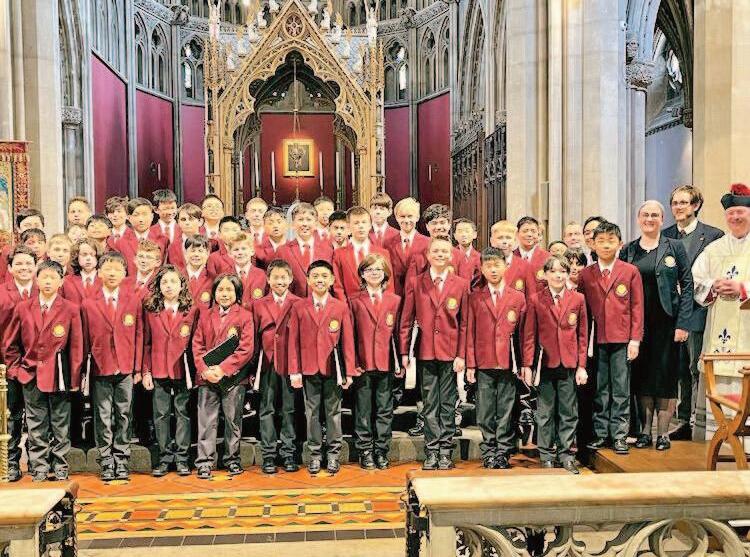
Inspirational Visit to The Portico Library
Saint Paul’s Catholic High School, Wythenshawe
The Poetry Club from Saint Paul’s Catholic High School in Wythenshawe, Greater Manchester recently visited the wonderful Portico Library in Manchester – a wonderful unique experience!
Year 9 pupil, Kira, explained: “Books of varying ages surrounded us, in an interior that had stayed almost the same as it had been hundreds of years ago, which gave a grand, mystical and ornate aura to the setting.”
work commitments. Francis then formed what was subsequently called the Third Order and enabled these people to follow the way Francis lived, but in the community Today that Third Order, renamed the Secular Franciscan Order, is the largest lay order in the world and 600.000 Catholics are members.
Their aims are to make our Lord known everywhere; to spread the spirit of love and harmony, to live simply and go from Gospel to Life and Life to Gospel.
We are today inviting you to join us at our gatherings (Fraternities) where you will receive a warm loving welcome.
We hope you will wish to join us or know more, please contact our formation Minister, Terry Mortimer on 07434574606 or Mortimer968@uwclub.net
“In this atmosphere we immersed ourselves even more in the literary culture of the Romantic and Victorian periods. We were able to read and hold many first edition texts, including collections of poetry from these periods. Along with the expert historical knowledge of our guide, this gave us the opportunity to learn not only about the poetry itself, but the evolution of how poetry and writing has changed over the years.”
In the Portico, the Poetry Club were in the presence of many first edition texts, such as Frankenstein by Mary Shelley, Captain Cooke’s journals, and other texts by authors such as Coleridge and Tennyson.

Kira continued: “Our fascination and enthusiasm were clear on our faces as we had the unique chance to ask questions about these texts as we held editions of the books in our hands that would have been held by some of their first readers.”
“We learnt that the size of books has changed as printing became easier and cheaper. One collection of poetry we saw was in the form of a pocket book – these books were so small and the text was so tiny that people had to use magnifying glasses to read them. Some books
also came ‘uncut’ – the pages were grouped together in batches of about four that had to be cut with a special paper knife, much like letter opening knives we might use today; so you needed a lot more equipment to read a book than you do today! Our guide told us that if you ever come across any old books from the 17-1800’s, the edges of their pages might be very rough, and this is where they will have been cut.”
“We also learnt about the lives of many of the United Kingdom’s most famous authors, including Mary Shelley and her husband Percy Byshhe Shelley,” Miss Jemima Burrell, English teacher and organiser of the Poetry Club, commented. “In the Year 7 English curriculum at St Paul’s, students study Percy Byshhe Shelley’s poem ‘The Masque of Anarchy’, which is about The Peterloo Massacre. This battle happened only a few minutes away from The Portico Library, where St Peter’s Square now is. It was amazing to feel the connection between the books we held in our hands and our own city.”
“All the information was presented with such detail and knowledge, which has given us the chance to develop our own poetry skills via this insight into the history of some of our great poets.”
“Mrs Evans (Head of English at St Paul’s) even spotted a first edition book which had been ‘adopted’ (sponsored to ensure its upkeep and restoration) by a close family friend of hers! Thank you so much to The Portico Library for this opportunity.”
The Catholic Post. June 2023. Page 5.
Francis repair my Church, which as you can see is falling into ruin
We immersed ourselves even more in the literary culture of the Romantic and Victorian periods
rcdea.org.uk
Churches Together in England announces appointment of Dr Anna Krauss as President of Fourth Presidency Group
Dr Anna Krauss, General Secretary of the Council of Lutheran Churches in Great Britain, was nominated by the Group’s members. Her term of office begins at the start of May 2023 for four years.
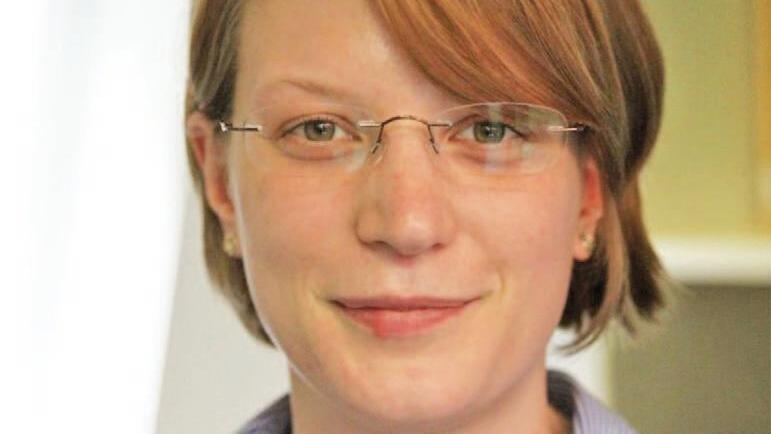
CTE General Secretary, Bishop Mike Royal, said: “CTE is delighted at the appointment of Dr Anna Krauss as CTE President, representing the Fourth Presidency Group. Anna is a formidable theologian, who does a stellar job in leading the Council for Lutheran Churches, alongside her ongoing involvement in local ecumenical church ministry. “Her voice will be a breath of fresh air and we look forward to supporting her to fulfil her role, alongside our other CTE Presidents.”
Dr Krauss said of her appointment: “I am honoured and humbled to serve as a President of CTE. My term follows an ‘empty chair’, a painful reminder of disunity among Christians. But ecumenism is hope – not a trite platitude,
but a deep conviction that we can recognize Christ in all of us and our respective churches. Our diversity enables us to spread the Gospel farther and more deeply.
“The work of reconciliation and collaboration among Christians helps us to spread the light of Christ into those corners of our dark and desolate world that we could not reach on our own. The Fourth Presidency Group is small but fully committed to the cause of Christian unity and we are looking forward to the period ahead.”
The Fourth President is nominated by the Church of Scotland (Presbytery of England), the Council of Lutheran Churches, the Evangelical Lutheran Church of England, the Synod of German-Speaking Lutheran, Reformed, and United Congregations in Great Britain (Evangelische Synode Deutscher Sprache in Großbritannien) and the Religious Society of Friends (Quakers in Britain).
Can you offer a Gift of Faith to Syria’s Christians?

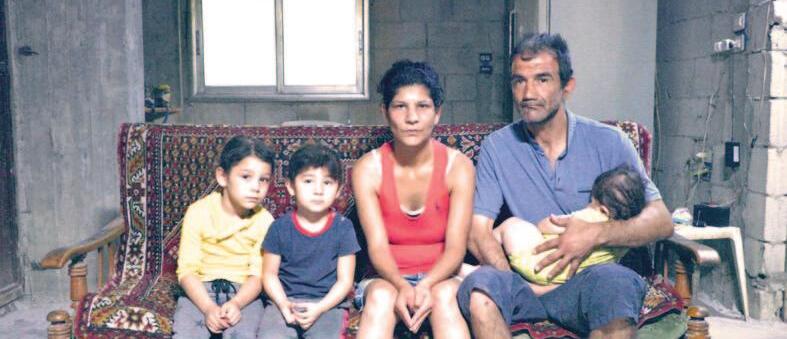
After more than a decade of war, persecution, a crippling financial crisis and the recent earthquake – displaced Christians in Syria are destitute and in urgent need. Thousands upon thousands have been displaced with at least 90 percent of the population living below the poverty line.
Syria’s suffering Christians need your prayers and support today. Yasser, a Christian father of four from Marmarita whose family is receiving help from ACN, told us: “Our situation is at rock bottom... We don’t have food, only bread, and we are struggling. The Catholic Church is the main caretaker of our family.”
With your help, ACN can provide Syria’s Christians with emergency aid and pastoral assistance. Your Gift of Faith can offer a lifeline to displaced Christian families in desperate need and help them keep the Faith alive.
The ‘Empty Chair’
In 2019 Hannah Brock Womack was nominated by the Fourth Presidency Group as its President. However, the Presidency was never enacted. This followed a request by CTE’s Member Churches at the Enabling Group in November 2019. The ’empty chair’ represented the lack of agreement within the churches in England regarding human sexuality.
Above: Dr Anna Krauss, General Secretary of the Council of Lutheran Churches in Great Britain
CTE General Secretary Bishop Mike Royal said: “CTE acknowledges the deep hurt felt by Hannah Brock Womack personally, the Quakers and by the Fourth Presidency Group. We must not lose sight of what has been a painful chapter over the last four years in our ecumenical journey.
Blessing King Charles at the Coronation
For the first time in nearly 500 years, a Catholic Cardinal took part in a Coronation in Westminster Abbey, when Cardinal Nichols stood alongside the Archbishop of Canterbury and other Christian leaders to invoke God's blessing on King Charles III.
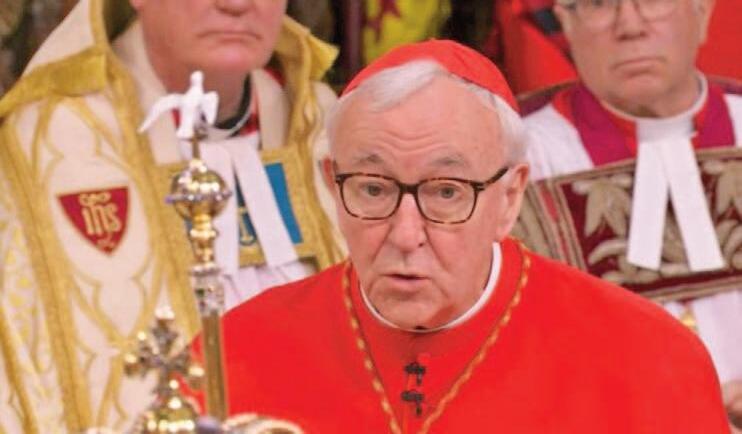
The Cardinal, Archbishop Mark O'Toole of Cardiff, Wales, Bishop Hugh Gilbert of Aberdeen, Scotland, and Archbishop Eamon Martin of Armagh and Primate of All Ireland joined the procession into Westminster Abbey. Also in attendance as guests were Cardinal Pietro Parolin, Secretary of Sate, representing the Holy Father, and
This was the first time in nearly half a millennium that Catholic prelates were present at a Coronation - in marked contrast to 70 years ago, when Catholics were not permitted to attend any services in a Protestant church.
The blessing on the King's reign was invoked by a number of Christian leaders, standing together, with the congregation joining them in prayer.
Page 6. The Catholic Post. June 2023.
CBCEW
Archbishop Miguel Maury Buendia, Nuncio to Great Britain.
This was the first time in nearly half a millennium that Catholic prelates were present at a Coronation
CBCEW
“Her voice will be a breath of fresh air and we look forward to supporting her to fulfil her role, alongside our other CTE Presidents.”
Rev/Sr/Mr/Mrs/Miss: ....................................................................... Address: ........................ ................................ Postcode: ................................. I enclose £100 £50 £25 Other £ ............ to help persecuted Christians in Syria. Please send me information about gift aiding my donation and/or setting up a regular gift enclose a cheque to Aid to the Church in Need OR please debit my VISA/MasterCard/Amex/Maestro Expiry Date: / Valid From Date: / Signature strip code (last block of digits): Issue No: (Maestro) Signature: ...................................................................... Please photocopy this form if you do not want to cut your copy of the Tablet. A23P3TA 0345 646 0110 www.acnuk.org acn@acnuk.org Donations can also be given online at www.acnuk.org/ta-syria 12-14 Benhill Avenue, Sutton, Surrey SM1 4DA A registered charity in England and Wales (1097984) and in Scotland (SC040748) Your Gift of Faith can offer a lifeline to displaced Christian families in desperate need. Please call 0345 646 0110 quoting A23P3TA or visit www.acnuk.org/ ta-syria SCAN QR CODE TO DONATE © Piotr Wolski
Cardinal Nichols reflects on the Coronation and offers prayers for the King
CBCEW
The day after the Coronation, at Sunday Mass in Westminster Cathedral, Cardinal Vincent Nichols spoke about the privilege of taking part in what was, in many ways, an ancient service with rituals that are very familiar to Catholics.
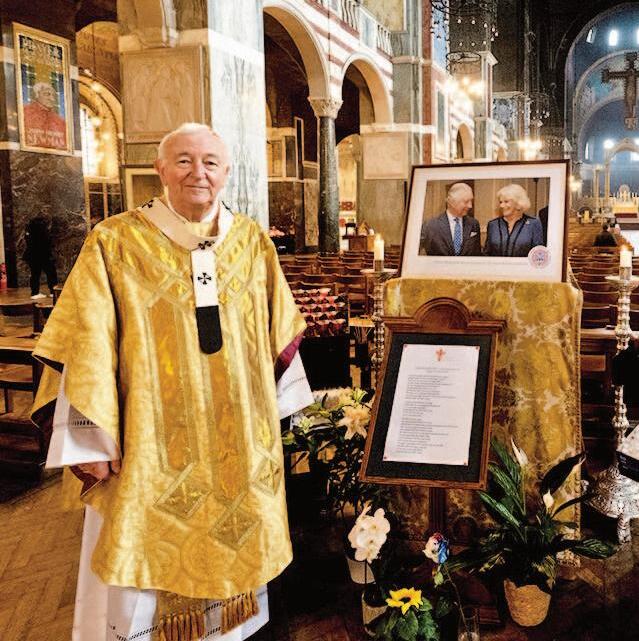
He preached about three aspects, found in the Sunday readings, that correspond to elements of the coronation ceremony – service offered in love, setting ourselves close to Christ, and to recognise that our destiny is a place in our Father’s House.
Full Homily
My brothers and sisters, in the wake of yesterday’s remarkable and historic coronation of King Charles III, today we pray for him. Being King is not easy. Think of the unending, high expectations that are placed on him. Think of the relentless intrusion he has to bear. Think of the criticism that is constantly offered, and then of the crises through which he will be expected to provide leadership. So we pray for him today.
There are three aspects in the readings that correspond to aspects of the coronation ceremony. You might remember that the first words that King Charles spoke when he entered the Abbey were, “I come not to be served, but to serve.” For some, it’s easy to be cynical when we hear those words from a person of such privilege. But it is, I believe, his sincere intention. It’s his way of echoing the priorities of his mother, and understanding the scope, responsibility and power which he has – he is there to serve.
In the first reading, we heard of the importance of service in the life of the Early Church, when the apostles were being put under pressure by divisions between the Hebrews and the Greeks, and people were saying, “we’re not getting our fair share of help.” So deacons were appointed to put love into action, in service. It was the response of the Early Church, that service offered in love overcomes division and hostility. That can apply in society as a whole and within the circles of our own families.
I remember listening to a wise leader of the Sikh community in Birmingham. People often brought their family difficulties to him seeking
advice. “When I am faced with a husband and wife who are rowing constantly,” he said. “I say to them, ‘before you go to sleep at night, you must wash each other’s feet’.” A Sikh calling on that wonderful example of Christ which was echoed again in the Coronation ceremony. So we can make our own that sense of service in our lives, too.
The second aspect comes from the First Letter of St Peter, that we have just heard, and Peter’s appeal to us, “Set yourself close to Christ.” There were many ways in which that was symbolised in the ancient rituals of the Coronation service. We had the period of silent prayer at the beginning; the moment when the King kissed the Bible, and then his personal prayer, said out loud, begging God that he be a blessing on all people.
Then, of course, his anointing and robing, before the blessing, of which I was privileged to play a part. Followed by the Eucharist. In all these ways, the King was being placed close to Christ. He echoes the faith of his mother, Queen Elizabeth II, who year after year spoke to us of how Christ was at the foundation of her life.
These are words for us too. Let us set ourselves close to Christ in those same ways. In our reverence for the Word of God, the Scriptures, in our daily practise of prayer, first thing in the morning and last thing at night. In our sharing in public prayer, in the circle of our family life, and in centring our lives on the Mass, on the sacrifice of Christ and receiving his precious body and blood.
The third aspect comes from today’s Gospel. The Coronation has been spoken of as a day of destiny for Charles. It is true, from birth he was destined for this moment. The Coronation is the start, an ongoing part of the King’s destiny.
Yet, at work here is a larger sense of destiny. Faith is a clear statement, a shining truth, that our destiny is a place in our Father’s House. That is our destiny. And Jesus says there is a place for each of us in that house. He assures us that our fulfilment is there, and that our lives, in his hands, will find that full and final destiny. Our lives, the life of the whole world, are being drawn in an upward movement to fulfilment, fulfilment in our Father’s House.
Also in this Gospel passage, in a slightly mysterious way, we learn that that destiny starts now, here. Because, as Jesus says, ‘to see me is to already see the Father’. To share life with Jesus is already to have begun eternal life. There is a unity between the Father and the Son, and in him we are offered our way, our truth and our life.
It is with this sense of destiny that we strive to overcome our daily difficulties and to grow in trust in the pathway of faith, in our beloved Saviour: a pathway of being close to Christ, of knowing our destiny and of being of service to all. This is so important, it is our trust and joy, for king and for commoner exactly alike.
A TOP FIVE CATHOLIC PREP SCHOOL
“Winterfold House School is an outstanding smaller Prep School with a long and peripatetic Catholic heritage”

Small classes and inspirational teaching
Highest standards of pastoral care
Being King is not easy. Think of the criticism that is constantly offered, and then of the crises through which he will be expected to provide leadership.
So we pray for him today.
The Catholic Post. June 2023. Page 7.
independent day school and nursery for boys and girls 330 pupils from babies to
13
House, Chaddesley Corbett, Worcestershire DY10 4PW 01562 777234 admissions@winterfoldhouse.co.uk www.winterfoldhouse.co.uk THE WINTERFOLD WAY R E G I
visits always welcome
Please contact Admissions to 昀nd out about joining Winterfold at any age from baby to Year 8 Non-selective
age
Winterfold
Indvidual
Saint Irenaeus
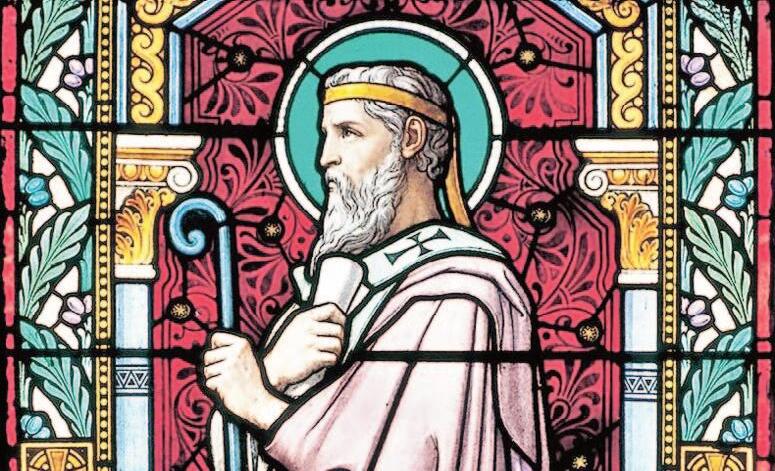
June 28 is the feast day
franciscanmedia.org.uk

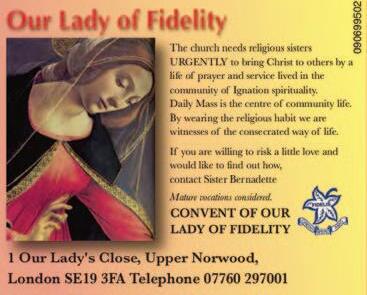



A theologian who combated heresies and emphasized Church unity
Saint Irenaeus’ Story
The Church is fortunate that Irenaeus was involved in many of its controversies in the second century. He was a student, well trained no doubt, with great patience in investigating, tremendously protective of apostolic teaching, but prompted more by a desire to win over his opponents than to prove them in error.
As bishop of Lyons he was especially concerned with the Gnostics, who took their name from the Greek word for “knowledge.” Claiming access to secret knowledge imparted by Jesus to only a few disciples, their teaching was attracting and confusing many Christians.
After thoroughly investigating the various Gnostic sects and their “secret,” Irenaeus showed to what logical conclusions their tenets led. These he contrasted with the teaching of the apostles and the text of Holy Scripture, giving us, in five books, a system of theology of great importance to subsequent times. Moreover, his work, widely used and translated into Latin and Armenian, gradually ended the influence of the Gnostics.
The circumstances and details about his death, like those of his birth and early life in Asia Minor, are not at all clear. However in 2022,


Reflection
A deep and genuine concern for other people will remind us that the discovery of truth is not to be a victory for some and a defeat for others. Unless all can claim a share in that victory, truth itself will continue to be rejected by the losers, because it will be regarded as inseparable from the yoke of defeat. And so, confrontation, controversy and the like might yield to a genuine united search for God’s truth and how it can best be served.
Benemerenti Medal awarded for fostering warm relations with our Anglican friends over many years

On the 23rd of April it appeared to be a normal Sunday service at St. Mary-in-theElms Church, Woodhouse, with Fr. John Farrell O.P. ending Mass a little earlier than expected. We are an unusual congregation. We celebrate Mass weekly with a Dominican priest from Holy Cross Church, Leicester on Sunday mornings, in an Anglican Church in Leicestershire. Reverend Lisa TemperleyBarnes, Parish Priest of St Mary’s and also St. Peter’s Church, Woodhouse Eaves, was discreetly present for Mass in order to mark an event which unites our two congregations – the presentation of the Papal Benemerenti Medal to Mr. Michael Kelly. Unbeknown to Michael, Fr. JohnPatrick Kenrick O.P. and Prior of Holy Cross Dominican Church and Priory, members of the Anglican community and several members of Michael’s family were quietly waiting in the vestry. Last June, in great secrecy, following Michael’s announcement that he was to retire as chair of the congregation committee, Major Bill Clark, retired Royal Signals Officer and founding member of the congregation, and Rod Darby, co-chair of the St Mary's RC Group and now holder of the Anglican liaison role, with Fr. John-Patrick's support, had applied for Michael to be nominated for the medal, in thanks and recognition for his
Fr. John-Patrick awarded the medal and scroll to Michael achievement over many years to foster warm relations with our Anglican friends and keep our congregation thriving. As Michael was invited to come to the front of the Church, the surprise guests emerged from the vestry to join the congregation. Fr. John-Patrick ceremoniously awarded the medal and scroll
to an astonished Michael, and Michael’s wife, Mrs Gill Kelly was thanked for her tremendous support over the years. What a happy event it was, with everyone enjoying a celebratory glass of Bucks Fizz and a piece of very excellent cake afterwards.

Page 8. The Catholic Post. June 2023. YOUR PEST,
OUR PROBLEM.
Stained glass window of Saint Irenaeus | photo by Gérald Gambier (c. 130 – c. 202)
Pope Francis named Saint Irenaeus a Doctor of the Church.
Subscribe@catholicpost.co.uk 01440 730399 www.catholicpost.co.uk Monthly National Catholic Newspaper National and International News from a Catholic Perspective with thoughtful articles to deepen Faith The UK’s first Carbon Neutral National Catholic Paper For all your advertising requirements please contact Natasha on 01440 730399 Natasha@cathcom.org
Vivian Brown, Co-Chair SMRC
Two Catholic Organisations Working Together

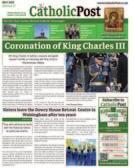
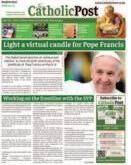
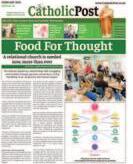


first meeting. In the liturgy booklet, the voices of prisoners and their families describe their experiences, alongside illustrations from the Benedictine Sisters of Turvey Abbey. The CWL used this liturgy to pray the Stations of the Cross online on Fridays during Lent, led by National Secretary Jean Clarke. Margaret von Speyr ordered a batch of booklets and led an in-person Stations service with her Bexhill-on Sea CWL group. They collected generous donations for Pact too.
This is an auspicious year for two Catholic organisations with long histories. In January, Catholic Womens’ League President Siobhan Garibaldi and member Margaret von Speyr, met with Pact’s Theresa Alessandro and Marie Norbury, to discuss working together.
Reflecting the energy of the 1200-strong CWL, Siobhan and Margaret brought some great ideas to that first meeting. Pact is the national Catholic charity providing support to prisoners and their families – this is Pact’s 125th anniversary year. When Siobhan put a handstitched ‘Cross in my Pocket’ on the table, Theresa and Marie knew it would be something prison chaplains could use in their ministry. By Easter, CWL members had provided 400 handmade ‘Cross in my Pocket’ items to prison chaplains for distribution among women and men in prison for whom faith can be life-changing and sometimes literally life-saving.
Theresa and Marie brought news of Pact’s new, illustrated Stations of the Cross liturgy to that
Frank Goulding

Siobhan had already spoken to Cardinal Nichols about her plans for CWL and her idea to form a partnership with Pact. Cardinal Nichols is Pact’s President so he understands and is concerned for the welfare of prisoners and their families. Together they had wondered whether CWL members might provide backpacks of useful, practical items for prisoners being released. So often, women and men leaving prison have very few belongings and little money. They may also have nowhere to stay. People in this situation report feeling frightened and overwhelmed – and yet they still hope to turn their lives around and make a fresh start.
Pact has identified two services where they can facilitate the CWL Prisoner’s Backpack project – in London and in Birmingham. CWL members will work with Pact services staff and volunteers to provide toiletries, snacks, underwear items and above all, dignity, for some of the most vulnerable people leaving prison.

In looking forward to working together, Pact CEO Andy Keen-Downs said, ‘People affected by the criminal justice system are often marginalised in our communities. There are more than 84,000 people in prison in England & Wales today – a number which is growing. I am delighted that members of the CWL will be helping to support the people we serve and the work we do at Pact. People in prison often tell me what a difference it makes to know someone cares about what happens to them. Helping people to make a fresh start is one way of putting our faith into action – and it makes communities safer too.
‘The Catholic Womens League welcomes new members. Join a branch near you or start a new group! You can find out more by emailing Jean at natsec@cwlhq.org.uk

Pact, Prison Advice and Care Trust, welcomes parish reps who can join our network and keep prisoners and their families in the hearts and minds of their local parish. Find out more: parish.action@prisonadvice.org.uk
Follow
Many Challenges Ahead

The month of June this year will present our country with many challenges, Whilst our own lives may not have changed much since Easter those who are leading our nation will know that much is expected of them. In the first few days of May the Coronation of King Charles III was a spectacular and colourful display of what the British do best. We all know that our country and the world cannot just live by ritual and pageantry no matter how much money is made from foreign tourism. That said the Coronation weekend was concluded by some 52,084 registered events of the ‘Big Help Out’ extra Bank Holiday. Will this unexpected festival of volunteers give the much needed extra boost that our charities need and will our own communities which may well incorporate a foodbank gain a long term benefit?
Many areas of England will have elected a considerable number of different councillors on May 4th They will bring new blood to represent our areas but like our MPs at Westminster they too must take appropriate responsibility for their actions and not be overwhelmed by the nature of any new office. So if we want our Royal and political leaders to face up to the challenges of 2023 we surely should make time to consider what we can do ourselves.
Our young people will always need guidance and today we should not only listen to their views on society but do our very best to advise them on how to handle social media. If we want to participate in this clearly we have to start at a very early age. Do we really want our children to have more friends online than in real life? One prominent regional newspaper
has featured loneliness for many years. Sadly it appears to be on the increase and not just with young people.
The Coronation was a deeply religious ceremony with some 2,300 guests including many world leaders. I will conclude this article by examining just how busy Pope Francis was during that week. At the celebration of Mass in Budapest the congregation was around 50,000. The Pope being fully aware of the new tragedy in Sudan gave special emphasis to safe corridors in Europe for all refugees fleeing war, poverty and climate change. Whilst in Hungary and then back at the Vatican Pope Francis was pursuing all diplomatic avenues to bring about peace in Ukraine. We must hope and pray that the mission will succeed.
The Catholic Post. June 2023. Page 9.
Pact on Facebook and Twitter @PactFaithAction
Pact is the national Catholic charity providing support to prisoners and their families –this is Pact’s 125th anniversary year
CBCEW
Donate now at www.reachfoundationuk.org Your money goes a long way! Reach Foundation UK - charity no: 1171521 For ALL of your Parishioners For some of your Parishioners Individual Subscriptions Online Subscriptions 100 copies: from £12 (12p per copy) 200 copies: from £23.20 (11.6p per copy) 300 copies: from £32.80 (10.9p per copy) 50 copies: from £9.60 (19.2p per copy) 10 copies: from £7.20 (72p per copy) Annual 1 Copy from £3.20 per month 1 Online Copy via Email from £2.40 per month Subscribe to www.catholicpost.co.uk All prices include delivery Please support our Advertisers For all your advertising requirements please contact Natasha on 01440 730399 Natasha@cathcom.org
Shrines in England
walsingham.org.uk
Beginnings
The Shrine of Our Lady at Walsingham was established around 1061 when Richeldis de Faverches prayed that she might undertake some special work in honour of Our Lady.

The Lady Richeldis was a holy woman with a great love of the Mother of God. She asked Our Lady for a way to honour her, and it was from this desire in her heart that the events of Walsingham unfolded. She was a woman of faith, she pondered, meditated and prayed. In answer to her prayer, the Virgin Mary led her in spirit to Nazareth, showed her the House of the Annunciation where the Angel greeted Mary, and asked her to build a replica in Walsingham as a perpetual memorial of the Annunciation.
This Holy House was built and a religious community took charge of the foundation. With papal approval the Augustinian Canons built a Priory (c 1150). Walsingham became one of the greatest Shrines in Medieval Christendom.
National Shrine of Our Lady, Walsingham
After the Reformation
In 1538, the Reformation caused the Priory property to be handed over to the King’s Commissioners and the famous statue of Our Lady of Walsingham was taken to London and burnt. Nothing remains today of the original shrine, but its site is marked on the lawn in “The Abbey Grounds” in the village.
After the destruction of the Shrine, Walsingham ceased to be a place of pilgrimage. Devotion was necessarily in secret until after Catholic Emancipation (1829) when public expressions of faith were allowed.
Slipper Chapel is Restored
In 1896 Charlotte Pearson Boyd purchased the 14th century Slipper Chapel, the last of the wayside chapels en-route to Walsingham, and restored it for Catholic use.
In 1897 by rescript of Pope Leo XIII, the sanctuary of Our Lady of Walsingham was restored with the building of a Holy House as the Lady Chapel of the Catholic Church of the Annunciation, King’s Lynn.
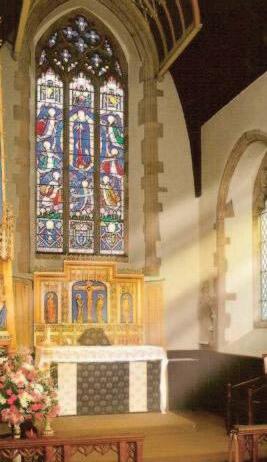
Pilgrimages begin again in 1897
The Guild of Our Lady of Ransom, brought the first public pilgrimage to Walsingham on 20th August 1897. Visits to the Slipper Chapel became more frequent, and as the years passed devotion and the number of pilgrimages increased.


Slipper Chapel declared the National Shrine of Our Lady for Catholics in England in 1934
On 19th August 1934, Cardinal Bourne and Bishop Lawrence Youens led the Bishops of England and Wales, together with 10,000 pilgrims to the Slipper Chapel. At this pilgrimage, the Slipper Chapel was declared to be the National Shrine of Our Lady for Catholics in England.
Pilgrimages Today
The Shrine now attracts some 150,000+ pilgrims during the pilgrimage season with some 50 Major Pilgrimages from Catholic, Diocesan or Ethnic groups and Catholic Societies or Associations as well as many Parish and Overseas groups as day pilgrims or residential groups. Come and see!
Photographs © National Shrine of Our Lady, Walsingham
Page 10. The Catholic Post. June 2023.
King Charles III –Coronation celebration street party
Ursuline Prep School, Warley
Bishop encounters vibrant Catholic Church in Pakistan punching above its weight

liverpoolcatholic.org.uk
Bishop Tom Neylon, Lead Bishop for Asia for the Bishops’ Conference, has recently returned from a week-long trip to Pakistan with the Catholic charity Aid to the Church in Need.
Visiting from 9-16 March, Bishop Neylon visited a number of projects funded by the charity and met with the faithful, priests and bishops in the major cities of Rawalpindi, Islamabad, Lahore and Faisalabad.
Making reference to the fact that Church attendance in Pakistan is very strong, Bishop Neylon received a warm welcome and explained how, at one Friday afternoon Mass in Rawalpindi, there were over 1,000 worshipers in the cathedral with many more outside unable to get in.
“The Church is very strong. It’s very much a minority – between one and two percent of the population would be Christian/Catholic and there are other minority faiths and religions in the country as well. Even though there are a small number of Catholics, in terms of the attendance at church – the place was full.
“The evidence we saw, without any kind of prodding or probing, was the number of people who would turn up for prayer or for Mass – there’s something like a 70% practice rate among the local Catholic population. So, given the environment in which they live,
where there can be discrimination of minorities, and well-documented cases where there’s been violence or even killings associated with places of worship, people make a deliberate choice to say, ‘yes, I want to live my faith. I want to practise my faith. I want to share my faith with my children.’”
Speaking on the Bishops' Conference Catholic News podcast strand, Bishop Neylon discusses how education is a key priority in the dioceses he visited.
“The education for young people, for young adults as well, [is very important] to try and lift them out of poverty, to seek qualifications to get them into the civil service, so they’re able then to join the wider community in serving Pakistan’s society through the civil service network.”
He also praised the Catholic Church for delivering education and healthcare services that provide for wider society and not just their own community.
“We heard stories that there are Catholic schools and Catholic hospitals, but they serve the wider community as well. They’re not just in an enclave or a ghetto, but they’re there really to serve the wider society. I think in terms of education, there’s something like 300 Catholic schools across the whole of Pakistan, and very often some of the schools are well subscribed by people not of Christian or Catholic faith, but the majority of people in the population.”
Bishop Tom Neylon made the visit to Pakistan in his capacity as Lead Bishop for Asia for the Catholic Bishops’ Conference of England and Wales at the invitation of Aid to the Church in Need who organised the visit. ACN UK’s website can be found at acnuk.org
All images © Aid to the Church in Need.
With help from our wonderful PFA the school celebrated the King’s Coronation in style with a Coronation Celebration Street Party on Friday. The school was ablaze with flags, bunting and balloons. Our school hall was transformed into a wonderful dining room fit for royalty with red white and blue decorations! All of our children, along with staff members, wore red, white and blue so as to fit in with the day’s celebratory theme. The children all made crowns and drew pictures in keeping with the royal
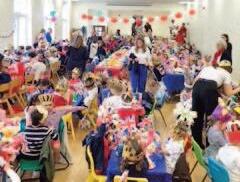


and independently judged. The winners of both were announced and celebrated by our school community. The children and staff enjoyed lunch together with everyone singing the National Anthem to end our amazing lunch. We waved our flags and sang our hearts out. Finally, no party would be complete without a visit from the ice cream van which brought great excitement- it was a wonderful way to mark the beginning of the reign of our new King!

The Catholic Post. June 2023. Page 11.
Even though there are a small number of Catholics, in terms of the attendance at church –the place was full
We waved our flags and sang our hearts out.

Page 12. The Catholic Post. June 2023.
Our Global Community

Pope Francis and Pope Tawadros II praise ongoing Catholic-Coptic dialogue
Uganda: Panyangara Silver Jubilee Celebration Day
Mill Hill Missionaries
is To Love and to Serve. Guided by this motto and encouraged by the Christian community we have been able to make Panyangara Parish what it is today.
Pope Francis and the Coptic Orthodox Pope Tawadros II have released a jointly-written preface for a new book, celebrating the 50th anniversary of the historic 'Joint Christological Declaration' that continues to strengthen ties between the Catholic and Coptic Churches.
Set to hit bookshelves on Wednesday, the book is entitled 'The Catholic Church and the Coptic Orthodox Church. 50th Anniversary of the Meeting between Pope Paul VI and Pope Shenouda III (1973-2023)'.
The preface, released recently, traces the path of dialogue which led to that historic encounter and the fruits which it has borne over the last half century.
The two Popes begin the preface by expressing the desire of their Churches to "journey towards full communion", while also recalling the progress that has been made thus far.
"We also need to give thanks to God by remembering the steps already taken and the distance already travelled, which are often much more important than we imagine," they write, adding that this recollection of history represents the purpose of the book.
Pope Paul VI met with Pope Shenouda III in the Vatican on 9-13 May 1973, the first such meeting between "a Bishop of Rome and a Pope of the Coptic Orthodox Church" in over 1,000 years, during which they signed the landmark Joint Christological Declaration.
The declaration crowned years of ecumenical and theological dialogue between the Catholic and Coptic Orthodox Churches following the Second Vatican Council.
It also marked the end of the Christological controversy which had arisen in the wake of the Council of Chalcedon in 451.
The meeting between Paul VI and Shenouda III continued to bear fruit in ecumenical relations, including the creation of the Joint International Commission between the Catholic Church and the Coptic Orthodox Church.
The Commission's work, note Pope Francis and Pope Tawadros II, led to the signing of the

Principles for Guiding the Search for Unity between the Catholic Church and the Coptic Orthodox Church in 1979 between Shenouda III and John Paul II.
"This commission in turn paved the way for the foundation, in 2003, of the theological dialogue between the Catholic Church and the entire family of Oriental Orthodox Churches, a dialogue that has already produced important documents testifying to the growing understanding between our Churches," say the two leaders.
Pope Francis and Pope Tawadros II also recall their first meeting, which took place in Rome on 10 May 2013, a date which they established as the annual "Day of Friendship between Copts and Catholics".
The two Popes conclude their preface by expressing their hopes that the ecumenical journey between their two Churches might continue to bear fruit in response to Christ's prayer "that they may all be one".
"May the fraternal love and friendship that unite our Churches continue to grow until the blessed and longed-for day when we can celebrate together at the same Altar and receive from the same chalice, 'so that the world may believe'!"
The 5th May 2023 has gone down in the history of Panyangara parish as a memorable day when all roads within Kotido and outside of Kotido led to Panyangara drawing a mammoth crowd for the celebration of the Silver Jubilee of the Parish. As Christians gathered together with the Bishop, priests, religious and faithful from other Christian confessions, it was clear that the Lord has smiled on us as always with a beautiful sunny morning and happy faces.
Panyangara Parish was established in 1998. The priests, Fr Philip O'Halloran, Fr Denis Hartnett and Fr Declan O'Toole, reported to Panyangara on 2nd April, 1998. Twenty-five years is such a significant number, and we could not be quiet about it because the Lord has been faithful to us in many ways. And so, this day has been made by the Lord for us to rejoice and be glad.
This jubilee celebration is an opportunity to remind ourselves how much God has walked with the Christians of the parish since its inception especially through the commitment of the Mill Hill Missionaries some of whom gave up their lives for the sake of the Christians in this Parish.
We celebrated the existence of the Mill Hill Missionaries in Kotido Diocese and in Panyangara. As Mill Hill Missionaries, our motto
In his homily, Bishop Dominic Eibu, the Bishop of Kotido Catholic Diocese, invited the Christian people to be a sharing community after the example of the missionaries who shared their gifts of faith to establish the mission. He thanked the missionaries for their selfless service and endeavors for the people in Kotido Diocese. The society Representative of the Mill Hill Missionaries, Fr Joe King congratulated the Christians for the celebration and encouraged them to now own and support the Church for the coming twenty-five years.
The beautiful liturgical celebration was spiced with the angelic voice of the youth choir and liturgical dance by the children.
After Mass, the politicians and local government officials admonished people to work for peace and unity for the transformation of Karamoja.
To make it a complete feast a meal was shared by all accompanied with some local drink and traditional dance. As the day ended everyone gave thanks to God for the blessings of twenty five years. The renewed sense of community and commitment will keep us as we look forward and tackle the realities that face our people, always putting our FAITH into ACTION as is the theme of this Jubilee.
Ignatius Nshing Tanjua MHM
He gave his life so that others might live Remembering the late Bishop John Joseph of Pakistan
John Pontifex
Bishop John Joseph, one of Pakistan’s leading human rights’ activists, stunned the world when he stepped out in front of a courthouse and shot himself in the head.
He was the first Punjabi Catholic priest, the first Punjabi Bishop of Faisalabad and a fearless champion of all those oppressed for their faith.
Twenty-five years on from his death, Dr John Joseph continues to be revered by Christians and non-Christians alike. This was immediately obvious to our small delegation from the Catholic charity Aid to the Church in Need (ACN) on a recent visit to Pakistan.
The trip, whose participants numbered Bishop Tom Neylon of Liverpool, included staying in the bishop’s house in Faisalabad from where he had run his diocese.
Relatives, priests and friends recalled the reasons Bishop John Joseph gave for the fateful decision he took.
In his suicide note, he explained that he was acting in protest at the court’s decision to sentence to death Ayub Masih, a young Christian man, found guilty of blasphemy.
Pakistan’s notorious ‘blasphemy laws’, sections 295B and 295C of the Pakistan Penal Code respectively, impose life imprisonment for desecrating Quranic texts and the death sentence for disrespecting the Islamic Prophet Mohammad.
As reported in ACN’s Persecuted and Forgotten? A Report on Christians oppressed for their Faith, of the 1,550 people accused of blasphemy between 1986 and 2017, Christians numbered 238 (15.3 percent) even though they make up less than two percent of the population.
Although no blasphemy death sentences have been carried out including that of Asia Bibi, perhaps the most famous case, accusations against Christians and others have often resulted in lynching, mob attacks on entire neighbourhoods and extra-judicial killings.
Speaking at an event in Pakistan to mark the 25th anniversary of Bishop John Joseph’s passing, Father Emmanuel Asi, a leading Catholic priest, said that his final act should be seen in the context of his life-long struggle for civil and human rights.
In keeping Bishop Joseph’s memory alive, Pakistan is enkindling the hope that one day even the most marginalised communities will be allowed to play their full part in society.
John Pontifex is Head of Press and Public Affairs for the Catholic charity Aid to the Church in Need (UK) www.acnuk.org
The Catholic Post. June 2023. Page 13.
"We also need to give thanks to God by remembering the steps already taken and the distance already travelled, which are often much more important than we imagine"
Vatican
News
And so, this day has been made by the Lord for us to rejoice and be glad
Book Reviews Book Reviews
Finding God in the Mess
Brendan McManus SJ and Jim Deeds
€11.95/£10.95
ISBN NO:9781788126045
www.messenger.ie
AN ANCHOR IN THE STORMS OF LIFE
In 399 BC the philosopher Socrates got himself into trouble when he queried the unexamined life. Almost 1,800 years later, St Ignatius of Loyola proposed reflection as a way of life. Ignatian spirituality posits that both learning from experience and applying that learning is essential for us to grow in self-awareness, understanding and acceptance. Jumping on another 500 years, can we say that this charism has relevance in our 21st century world?
Brendan McManus SJ and Jim Deeds believe so and have written several books on the


Finding God in the Mess


Brendan McManus SJ and Jim Deeds
136pp £10.95
Meditations and reflections that invite us to take a step back from busy lives and challenging situations, offering a solid foundation in the spirituality of St Ignatius.
Award Winner
The Catholic Media Association Awards
2021 – 1st Place (Prayer category)
The Independent Publisher Book Awards

2021 – Gold (Gift/Speciality/ Journal category)
application of the spirituality of St Ignatius. Now a new, revised edition of their best selling and award-winning book, Finding God in the Mess, has been published. This collection of meditations, reflective questions and practical suggestions are designed for us to find peace and meaning in lives that have become fragmented in a society where the ubiquity of technology and social media have dimmed objective enquiry and detached reflection.
First place winner of The Catholic Media Association Awards 2021 (Prayer category) and Gold Medal winner in the speciality/journal category of The Independent Publisher Book Awards 2021, Finding God in the Mess is partly a reflective prayer tool and partly a map for negotiating a way through the disarray, confusion and occasional chaos of life.
Brendan McManus SJ works as a spiritual director and retreat giver in Belfast. Jim Deeds is a poet and author and works as a retreat giver and pastoral worker in Ireland and abroad. Other titles they have written together include Discover God Daily: Seven LifeChanging Moments from the Journey of St Ignatius and Deeper Into the Mess: Praying Through Tough Times.
A Year of Mindfulness
 Dr Clare Campbell
Dr Clare Campbell
£12.50
ISBN: 0855977825
www.amazon.co.uk
In mindfulness and meditation, we can hear the voice of our own heart, which can be drowned out by our busy lives and minds.
I first learned about mindfulness and meditation on a headteacher’s retreat to Assisi, and in that beautiful, spiritual place, I found great peace from taking part in daily meditation practice. Before I had experienced it in secular ways and during Yoga, but never before had I used it as a way to pray. I had seen the benefits of mindfulness and meditation as a way to relax and calm down, but by using scripture as a focus, it became one of my favourite ways to pray.
When I got back to school, I wanted to share this peace with the children. Children in 2023 have such busy lives, they can have more stimulation in a weekend than their grandparents would have had in an entire year. It is more important than ever that we build a time for silence and stillness into the school day and teach the children the skills they need to still themselves, regulate their breathing and calm themselves down. Mindfulness aims to develop skills for stilling the body and mind in preparation for prayer. This can be done as part of prayer and liturgy through guided meditation based on sacred scripture as part of collective worship, or in group or individual meditation as and when needed. Breathing slowly, concentrating on the inhalation and exhalation of breath, focusing on a Mantra, a prayerful word or phrase, listening to prayerful music and carefully listening to the words of the leader are the tools that you can use to deepen your spiritual life and that of the children in your care.
Over the years I have been exploring different ways to pray and I found the 4 pillars of prayer to include, the saying prayer, the doing prayer, the thinking prayer and the being prayer. I would argue that mindfulness and meditation includes each one of these pillars of prayer at once. Meditation in the saying prayer can be a Mantra that you use, focusing on a spiritual word or phrase, being still is still an action, which is why it is linked to the doing prayer. And one of the elements of the being prayer is silence. Being still and being in the presence of God. With children I use the term, “going into our heart rooms,” this is the most special part
of our guided meditation, where children can be in their own personal “heart room” with God and speak to Him and listen to Him in their hearts.
Mindfulness is moving beyond ourselves to be transformed in God’s divine love.
Living The Word: Catholic Womens Bible
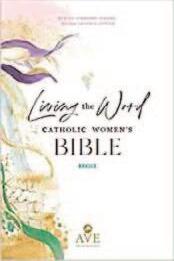
£51.95
Product Code 11743
ISBN NO:9781646801251
www,rpbooks.co.uk

Do you long to connect with a variety of women just like you who live the Word of God in the world each day?
That connection is what makes the Living the Word Catholic Women's Bible different from other Bibles for women: it includes almost fourhundred pages of special features created for women by women--more than forty scholars, teachers, religious, authors, ministers, and speakers--such as Leah Darrow, Sarah Christmyer, Johnnette Benkovic Williams, and Sr. Maria Kim-Ngân Bùi, FSP--who come from a variety of backgrounds and reflect the diversity of the Catholic faith. You can walk through scripture in community with other women who seek to become closer to God by reading his Word and living it in their daily lives.
The stunning beauty of the Living the Word Catholic Women's Bible also makes it stand out among its peers. The extraordinary and elegant design enhances your reading experience by connecting various features throughout the text including fifty profiles of women in the Bible, ninety-seven Living in the Light of Faith essays, Take it to Heart questions for reflection and journaling, and quotations from saints and holy women. The tranquil colors and other design elements help you feel at home in the Bible.
support our
Page 14. The Catholic Post. June 2023.
from your local bookshop. Also directly from our website:
or T:
oNewRevisedEdition fthisaward-winning book!
Available
www.messenger.ie
+353 1 676 7491
Please
Advertisers
Good Shepherd Sunday where coincidences coincidentally aligned
Gerry Molumby
St. John Houghton and St. Robert Lawrence are remembered yearly at their priory ruin site near Eastwood
The Fourth Sunday of Easter (30th April 2023) is traditionally celebrated as Good Shepherd or Vocations Sunday. This is because in the Gospel of the day (from St. John’s Gospel) Jesus speaks of himself as the Shepherd who is prepared to lay down his life for his sheep. Two shepherds who laid down their lives for their faith, namely St. John Houghton and St. Robert Lawrence are remembered yearly at their priory ruin site near Eastwood, Nottinghamshire. The two monks from the Beauvale Priory became martyrs by being cruelly killed at Tyburn, London in 1535; for not accepting Henry VIII over the Pope as head of the Church and they were canonised in 1970. Beauvale Priory (beautiful valley) was founded in 1343 by Sir Nicholas de Cantilupe. The monks at Beauvale were Carthusians, an enclosed religious order of the Catholic Church. The community survived peacefully living a life of worship and work for nearly two centuries until the disruption of the Reformation and the dissolution of the monasteries.
Fatima statue and saints relics visit York
middlesbrough-diocese.org.uk

The Centenary Pilgrim Virgin Statue of the Immaculate Heart of Mary and relics of Ss Jacinta and Francisco of Fatima are coming to St Aelred’s Church, York, this summer.
There will be a full programme of prayer and devotions during this time of special blessing. Everyone is invited to join us in this privileged visitation and to pray the Rosary and hear the story of Fatima and the messages of Our Lady of Fatima of the Rosary and the Angel of Peace as one family.
The World Apostolate of Fatima England and Wales (WAF) is coordinating the event.
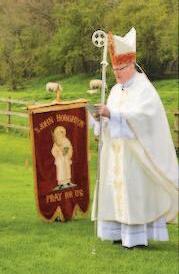
In 2017, the National Pilgrim Virgin Statue and relics of the two saints visited churches throughout the country, including Hull, Middlesbrough and York.
The organisers hope the statue will visit many religious houses, convents and parishes and become an instrument to provide catechesis on the Immaculate Heart of Mary, surrounded with thorns and needing reparation.
WAF also hopes to promote the First Saturday Devotion of Reparation, which signifies the intimate union of the hearts of Jesus and Mary.
Staying with the theme of ‘good shepherd’ our shepherd/bishop of Nottingham diocese Bishop Patrick McKinney led the annual memorial Mass, and homily preached by Rev. Deacon Anthony Sullivan.
The coincidence is complete as Good Shepherd Sunday coincided as being the birthday of our own Good Shepherd, Bishop Patrick, who is pictured in this pastoral scene with sheep and lambs surrounding the ruins of the priory.
Cardinal Vincent Nichols reconsecrated England and Wales to the Immaculate Heart of Mary during the visit, which coincided with the centenary of the apparitions.
The Centenary Statue, which was blessed at the Chapel of the Apparitions at Fatima, is a direct response to the invitation to rediscover the marvels of Fatima, “the light that came out of her heart who was Jesus himself”, that transformed the hearts of the little shepherds forever.

2-in-1 Crossword

 by Axe
by Axe
You can use both sets of clues to solve the puzzle: the solutions are the same.
CRYPTIC Across
7 Day before a period of abstinence upset the sad voyeurs (6,7)
8 Diverse views of two students in the group? (4)
9 Entirety: perhaps a long time coming? (8)
10 ‘Praise be to God': the French-American and English party embraced (4,3)
11 Lead of apostles appears to dwindle (5)
13 Oracle turned up, seen in company of lowly bishop (5)
15 Outmanoeuvre plan to get rid of dreadful Metro for something new in Paris (7)
18 Sorry Beth, an all-round tart prior to Lindisfarne (8)
19 One attends fires, getting up to no good (4)
20 Converted a Tao lifesaver and beatified one (6,2,5)
CRYPTIC Down
1 Contents of sermon by group Left ignored – it comes from the Parisian quarters (3,10)
2 Rights of Asian country put in a letter from Paul (6)
3 Ahab's wife's the first in jail: ever zealous, ever brazen, ever lustful (7)
4 French chap leaves during the season in Babylonia of old (5)
5 People of the Gold Coast, like before (6)
6 Book's antiquated cover is made for a Navy's Broad Church chap (7,6)
12 Quietly go on to Square assuming that the first of February will bring the Pope (7)
14 You ask how we enter heaven, initially in Hebrew,
Lord? (6)
16 Not obligatory in Church to elect four for admission (6)
17 Saul's daughter finds setter near pub, having fallen over (5)
QUICK Across
7 Time at the eve of Lent for confession and absolution of the faithful (6,7) 8 Title given to some bishops (4)

9 Time without end (8)
10 ' Glory to God in the highest', or 'Praise (be) to God', in the Latin (4,3)
11 Leader of the Apostles, entrusted with the ‘keys of the Kingdom of Heaven' (5)
13 Female seer (5)
15 Beaujolais ------- or ------- Riche, for instance (7)
18 Saint, the apostle of Northumbria (c 635-687) (8)
19 Chinese mafia (4) 20 Saint whose feast day falls on
15 October (6,2,5)
QUICK Down
1 Christ's promise of coming blessings (3,10)
2 Paul's longest letter: a text of primary importance for the Christian theological tradition (6)
3 Wife of Ahab, often synonymous with a wicked, scheming woman (7)
4 Region in modern-day Iraq before it became Babylonia (5)
In this devotion, Jesus himself desires reparation for the sins which pierce his mother’s sorrowful heart, the maternal symbol of her merciful love and desire for the salvation of all humanity in him.
Pope St John Paul II said the Fatima message is, “the true Gospel of Christ presented anew to our generation… Let us receive the light that comes from Fatima, let us be guided by Mary.”
The York visit takes place from Friday June 23 to Sunday June 25.
5 Ghanaian people, alternatively-named 'Ashanti' (6)
6 Poet, Oxford don and son of the founder of the Broad Church movement (7,6)
12 High Priest (7)
14 Popular derivation of the Hebrew proper name for God (6)
16 Given by vow (6)
17 Daughter of Saul, initially promised to David (5)
SOLUTION
The Catholic Post. June 2023. Page 15.
Across: 7 Shrove Tuesday, 8 Abba, 9 Eternity, 10 Laus Deo, 11 Peter, 13 Sibyl, 15 Nouveau, 18 Cuthbert, 19
20
of Avila. Down: 1 The
4
5
6
16 Votive,
Tong,
Teresa
Beatitudes, 2 Romans, 3 Jezebel,
Sumer,
Asante,
Matthew Arnold, 12 Pontiff, 14 Yahweh,
17 Merab.
Faith for the future
During Catholic Legacy Week, could you consider a gift in your Will to Catholic causes – to pass on your faith as a gift to the world?
On Sunday 28 May we celebrate Pentecost. On that day, the gift of the Holy Spirit was given to the Church. It inspired faith through generations – and even shapes our own lives today.
Could you pass on the gift of faith to future generations, by remembering Catholic causes in your Will?
To mark Catholic Legacy Week, 26 Catholic organisations have come together. You can give to the causes close to your heart. It could be the most significant gift of your life.

A gift in your Will is a gift of faith for future generations.
yourcatholiclegacy.org.uk/week
Catholic Legacy Week 28 MAY - 3 JUNE
Photograph: Agape Visuals
















 Mgr Daniel McHugh
Mgr Daniel McHugh


















































 Dr Clare Campbell
Dr Clare Campbell






 by Axe
by Axe

